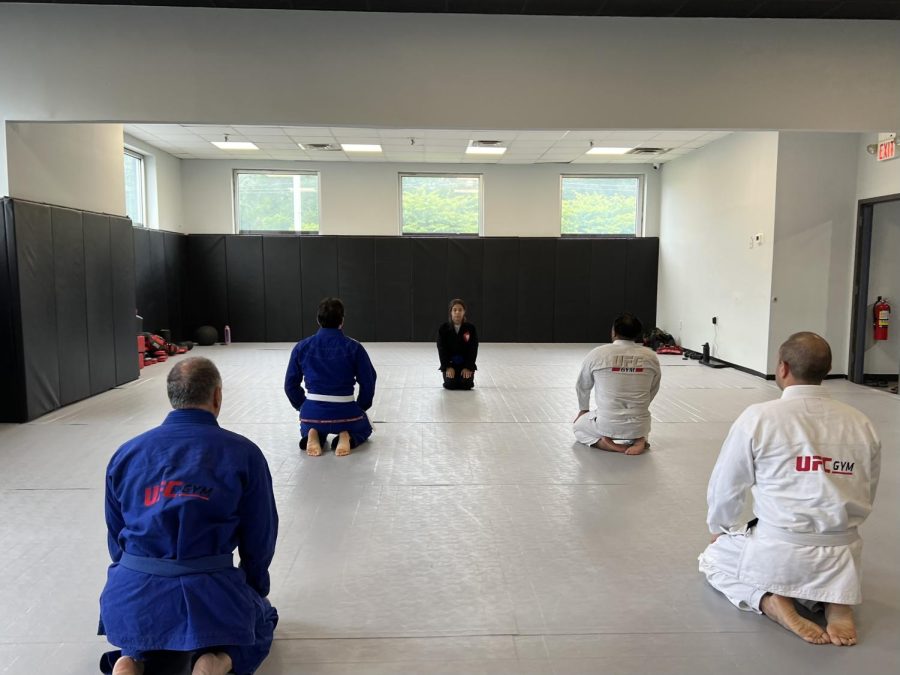Cardio, Weights and Mindfulness
How meditation can improve your workouts by taming the “monkey mind”
Coach Janecia Martinez leads a meditation before class at Bergen County Jiu-Jitsu.
July 2, 2022
It is easy to simplify working out as a set of physically demanding tasks that cause you to break a sweat because you are pushing your body beyond previous limits. People find themselves joining a gym and beginning their fitness journey for a multitude of reasons. For nonathletes, the goal is often a better lifestyle. Spending 45 minutes or more working out at least three times a week is said to already help a person take strides toward a healthier life. There is, however, another component to ensuring a healthy body and reaching higher levels of physical performance: a calmed mind.
Sports psychologists often recommend that athletes use psychological skills training (PST), which rehabilitates the mind with visualization, setting goals and positive self-talk. For athletes, having negative ideas about themselves can put a cap on performance levels. Reaching expectations can be more difficult, and even achieving personal goals can become impossible if they see themselves as less than capable of achieving their targets.
At some gyms, PST is put into practice. Co-owner and coach at Bergen County Brazilian Jiu-Jitsu Janecia Martinez includes mindfulness as part of her daily training for herself and her students. In her training sessions, Martinez explains how meditation helped her overcome her limiting beliefs that put up blocks in her athletic progression.
“My limiting belief recently was ‘I don’t feel worthy or deserving to access my full potential,’ which hindered me from performing at competitions and hinder me from giving my all during training because I was feeling like I wasn’t worthy to be anything great,” she said.
For nonathletes, their negative self-concepts affect their workouts and can even cause them to see their physical efforts as being ineffective. A possible solution is to incorporate meditation into one’s fitness routine. According to psychologists Lorenza Colzato and Armin Kibele, “Via (a) present-centered attention and (b) acceptance of experience, mindfulness meditation has been found to be effective in achieving optimal athletic performance through decreasing the level of anxiety, ruminative thinking, and enhancing the experience of flow.”
Martinez further explained that the flow state helps calm what she refers to as “the monkey mind.”
Martinez spoke about how jiu-jitsu helps her get into the flow state, saying that “I’m not thinking too hard; I’m thinking, ‘How do I progress in this position that I am in?’”
To be in a flow state means simply being focused on the task at hand. Distracting thoughts are tame, and your sole focus is your current activity. Martinez further explained that the flow state helps calm what she refers to as “the monkey mind,” which are nuisance thoughts that reign over the mind throughout the day.
It is possible to enter the flow state for any workout. For example, imagine that you are lifting weights and during your workout, you are telling yourself that you can’t reach the next weight or that you are too weak to continue. Take a few deep breaths and just focus on the task, as well as your form or the motions of your body.
Mindfulness does not have to be done in complete silence. Martinez explained that she spends her day “just trying to be in the present moment and focusing on my breath.”
Including mindfulness into your fitness routine also has shown long-term benefits, such as staying in the flow state longer and decreasing feelings of anxiety.
Whether you are just starting your fitness journey, are an experienced athlete or are a strict gym-goer, “the monkey mind” and limiting beliefs can create barriers to your progression. Incorporating mindfulness into your training can help make your goals seem easier to attain and help you overcome any self-doubt.
Get the latest Fordham sports updates on your Twitter feed. Follow The Observer’s sports Twitter page here.














